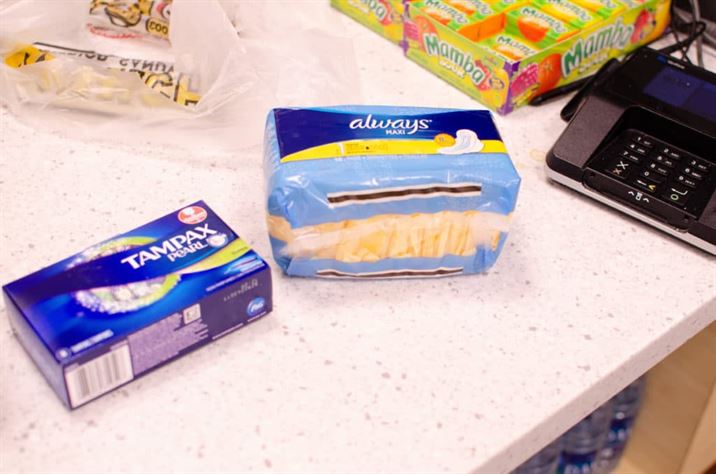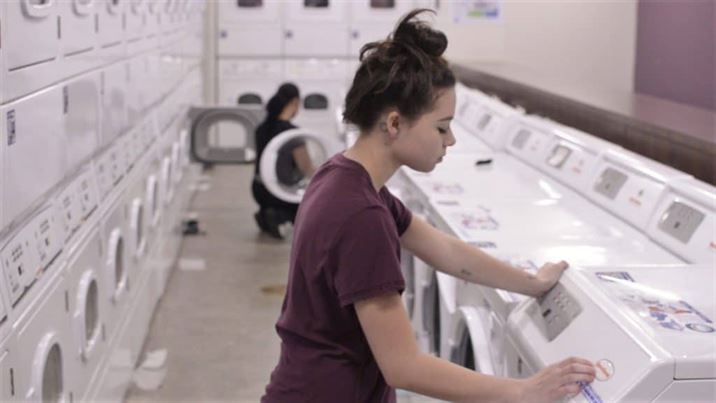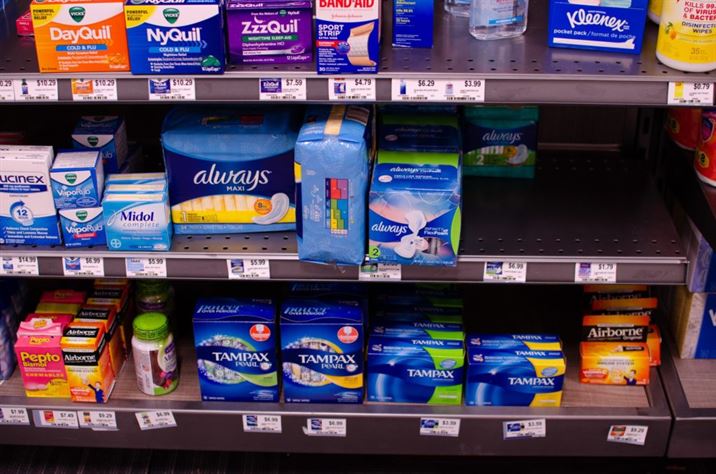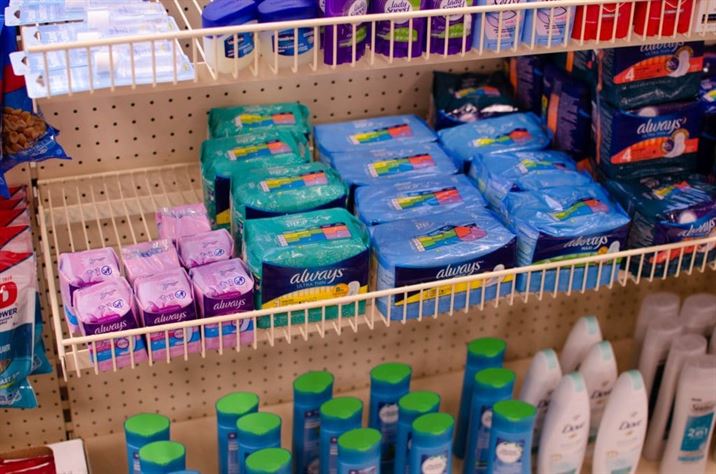The average woman spends around six years of her life total shedding the lining of her uterus. It sounds as uncomfortable as it often feels. Many women deal with acne breakouts, menstrual cramps, back pain, mood swings and other inconvenient monthly complications.
We use Midol, chocolate and feminine hygiene products to ease the continuation of our fixed routines. Depending on the individual, periods last between four and ten days and 70 percent of American women use tampons to remain active, according to CNN.
This means most women buy an average of 11,000 to 16,000 tampons within their life time. However, not all women have equal access to feminine hygiene products and access is only half the battle.
Women at Montclair State University make up 61 percent of the undergraduate student body and 71 percent of graduate students, according to Montclair State’s website.
This is not reflected by the limited stock and nonexistent variety at the on-campus locations where pads and tampons are available. For a female population of over 13,000 students, there is little to no thought about the products that our sisters, mothers, daughters and friends use at least 11,000 of in their lifetime.
According to a Montclarion article from January of this year, the Red Hawk Pantry’s most popular items include feminine hygiene products. Campus restrooms often have tampon and pad dispensers. Some dispensers charge a quarter a tampon and some are free.
This sporadically varies building to building; additionally some of the machines on campus are empty, jammed or broken. These containers and campus stores are stocked with Tampax tampons, Always pads and Maxithins pads.

At the Blanton C-Store, Tampax tampons cost $3.75 and Always MaxiPads cost $5.39.
Alexa Spear | The Montclarion
The University Health Center has free Maxithins pads, which are the same as those in the free bathroom dispensers. Feminine hygiene products can also be found at the bookstore, the Blanton Outtakes Market and in one vending machine on the bottom floor of the Student Center.
At nearly double the retail price, all period products on campus are costly. However, we live in one of 12 U.S. states that doesn’t tax tampons and pads.
Senior communication and media arts major Kristin Perretti is disappointed that more than half the country continues to tax products that should be considered a basic necessity.
“It’s frustrating and really makes no sense,” Perretti said. “Our country treats periods as this inconvenience. I mean, even the president has joked about that once. It gets old.”
Perretti expressed further frustration about stigmas of going through periods.
“It’s a naturally occurring thing that all women have to go through, and the stigma is obnoxious,” Perretti. “The fact that capitalism takes advantage of the stigma is even more frustrating.”

Senior communication and media arts major Kristin Perretti chooses settings on a washing machine in the Dinallo Heights laundry room.
Alexa Spear | The Montclarion
Most tampons today are composed of rayon and fluff pulp and hardly any cotton is used in modern mass produced tampons. Rayon is associated with the increased likelihood of toxic shock syndrome; the fibers are bleached for appearance and can end up stuck to the vaginal wall.
The organization, Women’s Voices for Earth (WVE), works to remove harmful chemical exposure from American households. WVE tested a variety of Tampax, Always and U Kotex pads and tampons, and found the products contained varying levels of carbon disulfide.
According to the study performed by Krzysztof Sieja, Jarosław von Mach-Szczypiński and Joanna von Mach-Szczypiński, their results “detected carbon disulfide emissions from all four tampons that contain rayon, but it was not detected in either of the all-cotton tampons.”
The two brands most widely distributed on Montclair State’s campus are full of chemicals that can cause hormonal disruption, early menopause and chemical imbalances in young women.
Senior business administration major Elaina Dzirko appreciates that Montclair State provides access to low-cost feminine hygiene products, but is also concerned about the potential health risks of their ingredients.
“I’m flabbergasted,” Dzirko said. “I’m glad that there are free products provided on campus because you might not be able to afford it or may forget to bring your own, but I’m going to have to do more research on what I was exposing my body to.”
The quality of feminine hygiene products makes a world of difference. Companies like Cora, Lola and Natracare sell feminine hygiene products made from pesticide-free organic cotton.
These brands are built on a holistically safer menstruation experience with the human body and environment in mind. Cora’s founders were appalled by dirty cotton, thus their products are made with Global Organic Textile Standard (GOTS) certified cotton from Slovenia.
Senior communication studies major Lindsay Slaff believes that it’s important to choose organic products for several reasons.
“It definitely makes a difference whether feminine hygiene products are made out of organic products,” Slaff said. “Chemicals are constantly being ingested or put onto our skin, such as food and makeup, and the only difference is that the ingredients must be shown to consumers.”

The university bookstore located in the Student Center offers a few types of pads and tampons, none of which are organic.
Alexa Spear | The Montclarion
Slaff suggested that if the government cared more about women’s needs, ingredient lists would be mandatory.
“I think if the government made it mandatory to include the ingredients on boxes of pads and tampons, more people would choose an organic alternative,” Slaff said. “Aside from benefiting the human body, organic alternatives make a difference on the environment as well.”
For every month’s supply purchased, Cora donates a month’s supply to young women in need in India, Kenya and the United States. Upon discovering Cora, I was skeptical. Organic tampons sounded like a plot established by the bourgeoisie to scam me out of four extra dollars a month.
Before Cora, I was simply using the brand my mother had chosen for me when I began menstruating. I never questioned it, assuming that in her 40 years of living with le cramp, she had discovered the pinnacle of feminine hygiene products.
Last year, I made the switch to organic products only, and I never looked back. Everyone deserves to live free of harmful toxins. It’s time that we work to educate and advocate for a healthy change. Periods are organic, and the products we use to cope with them should be, too.



